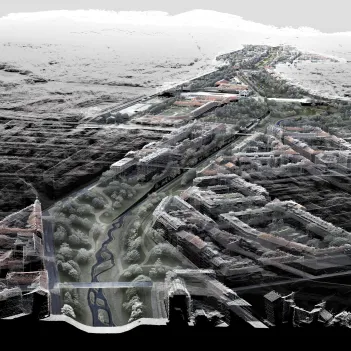CoCoNet
Co-creative Cohabitation Network

© CoCoNet
- Category
- Project
- Call
- DUT Call 2023
- Duration
- –
- Project coordinator
- TU Wien
Urban streets are still shaped by car-centric design, while climate pressure, biodiversity loss, and demand for high quality green space intensify. Yet planning remains fragmented - mobility, climate and biodiversity considerations are rarely explicitly integrated. This siloed approach leads to missed synergies and spatial conflicts. At the district scale, urban street environments concentrate these conflicting demands, making them key areas where tangible and meaningful change can take place.
How can co-creative processes and integrated spatial evidence reveal synergies between mobility, climate, sound, and ecological connectivity, support inclusive and sustainable street transformations and overcome fragmented urban planning?
How can multidisciplinary, integrated modeling reveal interactions between these different disciplines and evaluate their synergistic or conflicting nature?
Which role can integrated audio-visual 3D models play within this process?
CoCoNet develops methods to identify synergies between mobility, microclimate, ecological connectivity, and sound at the district scale. The focus lies on spatial quality and co-creative processes that support inclusive, sustainable street transformations. To enhance planning for urban resilience, the project combines mobility strategies with nature-based solutions (NBS) that also address wildlife’s ecological requirements . By integrating human–nature interactions, it demonstrates the value of conservation planning measures beyond conventional biodiversity assessments. CoCoNet also fosters shared understanding and collaborative decision-making among stakeholders, creating a foundation for cross-sectoral planning and long-term transformation capacity.
CoCoNet connects spatial modelling with design in two co-creative, iterative processes using virtualization as key mediator.
1. Integrated Modelling
supporting shared understanding, collaborative decision-making and identification of synergies.
2. Co-Creative Planning & Design
including city administrations, local initiatives, and urban planning students ensuring contextual relevance, real-world impact and feedback loops.
3. Spatial Virtualization
in form of 3D audio-visual point cloud models serving as a tool for knowledge transfer, understanding, and as basis for discussion.
CoCoNet delivers decision-support tools and spatial evidence to guide the transformation of urban streets towards climate-resilient, biodiverse, and inclusive environments. Case studies generate transferable insights on synergies between mobility, climate, sound, ecological connectivity , and design. Participatory methods strengthen institutional capacity, cross-sector collaboration, and stakeholder ownership. Immersive spatial virtualisations support dialogue and negotiation. Academic and practice-oriented outputs foster long-term knowledge exchange. Ultimately, CoCoNet promotes a shift towards integrated, co-creative, and evidence-based planning—reducing car-dependency while enhancing urban quality of life.
Austria
Germany
Switzerland
ETH Zürich, TU München, yverkehrsplanung GmbH
City of Erfurt - Civil Engineering and Transport, City of Munich - Green Space Planning, City of Vienna - Environmental Department (MA22) and Urban Development and Urban Planning (MA18), City of Zurich - Office of Geomatics + Surveying, umverkehR Zürich, Verein Lokale Agenda 21 Vienna, Verein Seebahn-Park Zurich
Contact
Katrin Hagen
katrin.hagen@tuwien.ac.at